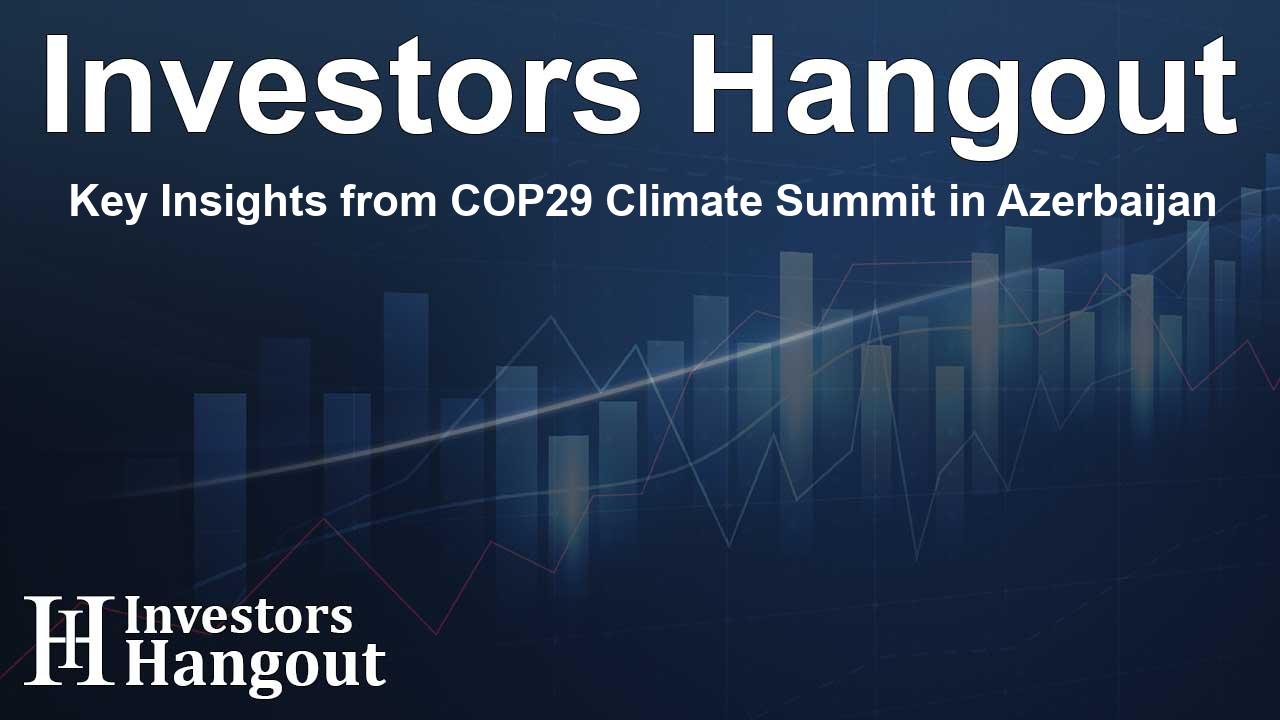Key Insights from COP29 Climate Summit in Azerbaijan

Takeaways from the COP29 Climate Summit
This year's U.N. climate summit in Azerbaijan brought to light critical discussions and insights regarding global climate policies. The conference, which extended its negotiations over two weeks, eventually reached a consensus on climate finance, albeit two days past the deadline.
Challenges in Climate Financing
The primary focus of COP29 was to establish new global climate finance targets. Delegates wrestled with the proposal of $300 billion annually by 2035, a number deemed insufficient by many developing nations. These countries expressed concern that the agreed timelines might hinder the transition to sustainable energy solutions.
Concerns Raised by Developing Nations
Many representatives from developing countries criticized wealthier nations for attempting to incorporate contributions from less affluent countries into the overall financing targets. There was a palpable sense of frustration, especially from nations like India, as they highlighted the disproportionate expectations placed upon them.
Political Climate Influences the Summit's Tone
The atmosphere at COP29 was notably affected by the political developments in the United States, particularly the anticipated presidency of climate skeptic Donald Trump. His commitments to reduce U.S. engagement in global climate initiatives cast a shadow over discussions, especially given the U.S.'s historical role as one of the largest polluters.
Impact on Financial Commitments
With the U.S. unlikely to offer significant contributions or leadership in climate discussions, the ambitious financial targets further dialed back, dampening hopes for impactful outcomes from the summit.
Progress on Carbon Credits
Despite the hurdles, a noteworthy agreement emerged from COP29 regarding carbon credits. After much deliberation over the years, countries reached a consensus to start developing a framework for carbon trading. The goal is to enable countries to monetize carbon credits, potentially leading to an influx of funding for climate initiatives.
Future Details Still Needed
While this step is encouraging, many logistical details remain unresolved including elements like registry structure and transparency obligations. Still, supporters of the initiative are hopeful that these developments could channel substantial investments into climate-resilient projects.
Growing Concerns about Climate Trends
Amid many discussions, an alarming trend surfaced – greenhouse gas emissions and global temperatures continue to rise. The year is projected to be one of the hottest on record, reflecting the growing climate crisis that demands immediate attention.
Real-World Impacts of Climate Change
Countries around the globe have faced severe climate impacts this year, including devastating floods, droughts, and subsequent food shortages. Extreme weather events have led to loss of lives, altered economies, and highlighted the urgent need for proactive measures.
Trade Policy and Climate Challenges
Trade tensions also formed a significant part of COP29 deliberations. Developing countries advocated for revisiting trade-related barriers that hinder investment in green technologies. The upcoming introduction of a carbon border tax by Europe became a central topic, alongside concerns that new tariffs could further complicate trade relations.
Attention on Trade Collaborations
In acknowledgment of these issues, the U.N. climate framework decided to address trade matters in future sessions, paving the way for discussions on ensuring equitable trade practices that support sustainable development.
Fossil Fuel Context and Future Directions
This year marked the third consecutive COP held in a nation with significant fossil fuel production backgrounds, posing questions about the conflict of interest in climate negotiations. Statements made during the summit from oil and gas representatives suggested a reluctance to shift away from fossil fuel reliance.
Future Pathways Beyond COP29
Regrettably, the summit fell short of establishing robust strategies to uphold commitments from earlier COP discussions around moving away from fossil fuels. Many advocates viewed this as a setback, highlighting the influence of fossil fuel interests in climate dialogues.
Frequently Asked Questions
What was the main outcome of COP29 regarding climate finance?
The summit concluded with a target of $300 billion per year by 2035 for global climate finance, although many developing countries viewed it as insufficient.
How did the U.S. political climate affect COP29?
The anticipated presidency of Donald Trump, known for his climate skepticism, negatively impacted discussions and expectations for U.S. contributions.
What significant agreement was made about carbon credits?
COP29 established a framework allowing countries to create and trade carbon credits, aiming to enhance funding for climate projects.
What urgent climate trends emerged from the summit?
Countries recognized that greenhouse gas emissions and temperatures continue to rise, indicating that current efforts are insufficient to combat the climate crisis.
How do trade policies relate to climate discussions at COP29?
Developing nations raised the issue of trade barriers impacting their ability to invest in greener economies, leading to plans for future discussions on these matters.
About Investors Hangout
Investors Hangout is a leading online stock forum for financial discussion and learning, offering a wide range of free tools and resources. It draws in traders of all levels, who exchange market knowledge, investigate trading tactics, and keep an eye on industry developments in real time. Featuring financial articles, stock message boards, quotes, charts, company profiles, and live news updates. Through cooperative learning and a wealth of informational resources, it helps users from novices creating their first portfolios to experts honing their techniques. Join Investors Hangout today: https://investorshangout.com/
Disclaimer: The content of this article is solely for general informational purposes only; it does not represent legal, financial, or investment advice. Investors Hangout does not offer financial advice; the author is not a licensed financial advisor. Consult a qualified advisor before making any financial or investment decisions based on this article. The author's interpretation of publicly available data shapes the opinions presented here; as a result, they should not be taken as advice to purchase, sell, or hold any securities mentioned or any other investments. The author does not guarantee the accuracy, completeness, or timeliness of any material, providing it "as is." Information and market conditions may change; past performance is not indicative of future outcomes. If any of the material offered here is inaccurate, please contact us for corrections.